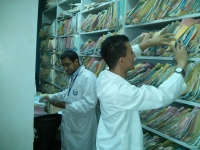 The survey aims to target 331 health care facilities including 15 hospitals throughout the 5 northern governorates.Over 100 researchers conduct assessment in 5 northern governorates
The survey aims to target 331 health care facilities including 15 hospitals throughout the 5 northern governorates.Over 100 researchers conduct assessment in 5 northern governorates
Led by the Ministry of Health in Jordan, and in cooperation WHO, United Nations Population Fund (UNFPA), United Nations Office of the High Commissioner for Refugees (UNHCR), UNICEF, and with the support of international nongovernmental organizations, a joint rapid health facility assessment is being conducted to assess the impact of non-camp-based Syrian refugees on the health service delivery system in Mafraq, Irbid, Zarqa, Ajloun, and Jeresh in Jordan.
WHO’s Dr Buthaina Ghanem stated, “We will start the data analysis as soon as the data collection is completed, then within 10 days the draft report will be available. A validation workshop to obtain comments from a wider group of stakeholders will be organized and the report finalized and launched.”



